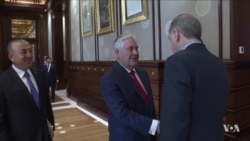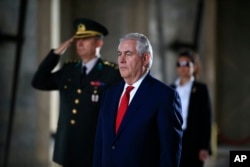U.S. Secretary of State Rex Tillerson hailed Turkey as a trusted ally after meeting with Turkish President Recep Tayyip Erdogan and other leaders Thursday during his visit to Ankara.
Tillerson underlined the importance of Turkey in the battle against Islamic State militants.
But the two NATO allies remain at loggerheads over Washington's support for the Syrian Kurdish PYD and its militia, the YPG, in fighting IS. Ankara accuses the PYD of being a terrorist organization affiliated with the PKK or Kurdistan Workers' Party, which is fighting the Turkish state.
Watch: US Secretary of State Tillerson Tackles Dilemma in Turkey
In a joint news conference with Tillerson, Turkish Foreign Minister Mevlut Cavusoglu stressed Turkey's opposition to support of the PYD but did not directly criticize the Trump administration.
'A number of options'
Tillerson acknowledged no breakthrough on the dispute, saying more discussions were needed.
"We are exploring a number of options and alternatives," he said, but he reiterated Washington's support of Ankara in fighting the PKK.
"We stand alongside Turkey in their fight to stop terrorism directed against its country and its people. The PKK attacks in Turkey last year remind us how close to home the threat of attack is for the Turkish people," said Tillerson.
With Washington stepping up its military support of the YPG before the operation to liberate Raqqa, Syria, the self-declared IS capital, Ankara increasingly appears resigned to the fact that its call for its military forces to replace the Syrian Kurdish groups has been rejected. But a presidential source ruled out any retaliatory measures against the United States, stressing that Turkey did not want the issue to undermine future cooperation.
Tillerson paid tribute to Turkey's hosting of 3 million refugees and said his talks focused on efforts to allow their return.
"Those were the subject of our conversation today, to have exchange of views, the best way forward to create zones of stabilization to allow the return of people to Syria," Tillerson said, adding, "And to set the stage for a longer-term political solution."
Ankara's view on zones of stabilization is not dissimilar to its demand for safe havens.
Just before Tillerson's arrival, Turkish Prime Minister Binali Yildirim announced the end of Turkey's military operation in Syria, declaring it a success. Operation Euphrates Shield had been a point of tension with Washington as Turkish forces threatened Syrian Kurdish forces of the PYD.
Atilla's arrest
Clouding Tillerson's visit was Monday's arrest in New York of Mehmet Hakan Atilla, a senior executive of a Turkish state-owned bank, on charges of money laundering and Iranian sanction busting. During the news conference, Cavusoglu described the arrest as politically motivated: "This process is a political one, because the former prosecutor had close ties with the Fethullah terrorist organization."
The extradition of U.S.-based Turkish cleric Fethullah Gulen was also discussed. Turkish prosecutors accuse Gulen of masterminding July's failed coup attempt. Washington insists the issues are a matter for the courts.
Despite the differences, Ankara appears eager to work with Washington, in particular to counter what it sees as the rising power of Iran and Russia in the region.
Tillerson acknowledged shared common ground on containing Iran.
"The United States and Turkey share many broad goals for the region, reducing Iran's ability to disrupt the region," he said. The secretary of state spelled out that future cooperation would be built on fighting IS, bolstering regional stability and conducting bilateral trade.
Cavusoglu, too, was eager to look to the future.
"We have just to inject a new dynamism into U.S.-Turkish relations," he said.







